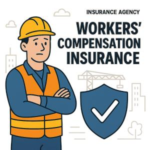
Georgia Security Guard Workers’ Comp Requirements Every Owner Must Know
August 19, 2025
High-Risk Senior Home Care Workers’ Comp: Navigating the Assigned-Risk Pool
August 19, 2025In the complex and highly regulated healthcare industry, medical staffing agencies play a pivotal role in ensuring that qualified professionals are available to meet patient care demands. However, alongside the critical obligation of workforce management lies the equally important obligation of maintaining compliance with workers’ compensation insurance requirements. Navigating the intricate landscape of workers’ comp insurance is essential for medical staffing agencies to protect their employees, mitigate financial risks, and adhere to legal mandates. This comprehensive guide provides an in-depth overview of workers’ compensation insurance tailored specifically for medical staffing agencies,outlining key compliance considerations,best practices,and strategic insights to help agencies safeguard their operations and uphold industry standards.
Table of Contents
- Overview of Workers’ Compensation Requirements for Medical Staffing Agencies
- Key Risk Factors impacting medical staffing Employees and Employers
- Choosing the Right Workers’ Compensation Insurance Provider for Healthcare Staffing
- Best Practices for Ensuring Compliance and Managing Claims Effectively
- Q&A
- The Way Forward
Overview of Workers’ Compensation requirements for Medical Staffing Agencies
navigating the landscape of workers’ compensation insurance is critical for medical staffing agencies, were the risk of workplace injuries may be heightened due to the nature of healthcare roles. Compliance begins with recognizing that workers’ comp coverage is typically mandated by state law, meaning agencies must secure insurance that meets or exceeds regional requirements. Key mandates frequently enough include coverage for both permanent and temporary staff, ensuring that all healthcare professionals, whether directly employed or contracted, are protected under the agencyS policy. Failure to comply can result in severe penalties,including fines,legal liabilities,and loss of eligibility to operate within certain jurisdictions.
To assure compliance, agencies should focus on several essential elements:
- Classifying employees correctly to align premiums and coverage accurately;
- Maintaining up-to-date safety protocols that reduce claims and promote worker wellbeing;
- Understanding exemption criteria that may apply based on state-specific nuances or employee roles;
- Regularly reviewing policy limits and endorsements to adapt to evolving workforce structures and risk exposures.
| compliance Element | Key Actions |
|---|---|
| Employee Classification | Accurate role-based categorization |
| Safety Programs | Regular training and equipment updates |
| Coverage Scope | Include all temporary and permanent staff |
| Policy Monitoring | Annual reviews and insurer communication |
Key Risk Factors Impacting Medical Staffing Employees and Employers
Medical staffing employees face unique hazards due to the diverse settings and responsibilities they encounter daily. From working in high-pressure hospital environments to traveling between multiple facilities, these professionals must navigate risks such as exposure to infectious diseases, physical injuries from patient handling, and long hours causing fatigue. Employers in the medical staffing industry, thus, need to anticipate these challenges and tailor their workers’ compensation policies accordingly to ensure comprehensive coverage and employee safety.
On the employer side, compliance complexities arise due to varied contract obligations and multi-site operations. factors such as fluctuating workforce size, varying state regulations, and the integration of temporary staff amplify the risk exposure and administrative burden. Key considerations include:
- Compliance with jurisdiction-specific workers’ comp laws
- Clear classification of medical staffing roles for accurate premium calculations
- Robust injury reporting and claims management protocols
- Proactive employee training programs to mitigate workplace hazards
Choosing the Right Workers’ Compensation Insurance Provider for Healthcare Staffing
Selecting a workers’ compensation insurance provider specialized in healthcare staffing requires a careful evaluation of several key factors. First, ensure the provider offers comprehensive coverage tailored to the unique risks faced by healthcare professionals, including nurses, therapists, and aides.Look for insurers with proven experience in the medical staffing sector, as they understand industry-specific challenges such as varying state regulations and high turnover rates. Additionally, the provider’s claims management process should be efficient and clear, minimizing downtime and facilitating swift worker recovery.
When comparing potential insurers, consider the following critical criteria:
- Financial stability and ratings from agencies like A.M. Best or Standard & poor’s
- customizable policy options that can adapt to different staffing models and contract terms
- Strong network of healthcare-specific risk management resources
- Competitive premium rates combined with value-added services
- Compliance support to help navigate complex state-by-state regulations
| Criteria | What to Look For | Why It Matters |
|---|---|---|
| Experience in Healthcare Staffing | Specialized underwriting & claims handling | Ensures policies reflect industry realities |
| Financial Strength | Strong ratings (A or higher) | Guarantees claim payout reliability |
| Claims Processing | Fast, transparent procedures | Reduces workforce downtime |
| Policy Flexibility | Options tailored to temp & perm staff | Matches coverage to business needs |
Best Practices for Ensuring Compliance and Managing Claims effectively
Maintaining strict adherence to workers’ compensation requirements is paramount for medical staffing agencies looking to protect their workforce and mitigate financial risks. One of the best approaches is to implement a comprehensive compliance management system that integrates regular policy reviews, employee training, and thorough documentation practices. Regular audits should be conducted to verify that all coverage details align with current state laws and contractual obligations. Additionally, empowering staff with knowledge about workplace safety and reporting protocols encourages a culture of accountability and transparency, which is vital in minimizing claim disputes and delays.
when it comes to managing claims, swift and structured response strategies can dramatically improve outcomes. It’s essential to establish a centralized claims management team responsible for tracking incident reports, coordinating medical treatment, and liaising with insurance carriers. Utilizing a digital claims management platform can streamline communication and maintain detailed records, reducing administrative errors and improving claim resolution times. Below is a fast reference table outlining critical actions during the claims process:
| Step | Key Action | Recommended Timeline |
|---|---|---|
| 1. incident Reporting | Notify supervisor and document event | Within 24 hours |
| 2. medical Evaluation | Arrange immediate professional assessment | Within 48 hours |
| 3. Claims Notification | Submit claim to insurer | Within 3 days |
| 4. Follow-Up | Monitor recovery and communicate with all parties | Ongoing |
- Maintain transparent communication between employees, medical providers, and insurers to avoid misunderstandings.
- Update and review policies regularly to ensure they reflect evolving legal requirements and workplace conditions.
- Engage expert consultants periodically for compliance checks and claim audits to identify areas for betterment.
Q&A
Q&A: Medical Staffing Agency Workers’ Comp Insurance – The Ultimate Compliance Guide
Q1: What is workers’ compensation insurance,and why is it important for medical staffing agencies?
A1: Workers’ compensation insurance is a form of coverage that provides medical benefits and wage replacement to employees injured on the job. For medical staffing agencies, it is vital because it protects both the agency and its placed healthcare workers from financial risks associated with workplace injuries, while ensuring compliance with state laws.
Q2: Are medical staffing agencies required by law to carry workers’ compensation insurance?
A2: Yes, most states mandate that medical staffing agencies secure workers’ compensation insurance for their employees, including temporary and contract staff. Compliance requirements may vary by jurisdiction, so agencies must verify local regulations to avoid penalties and legal exposure.
Q3: How does workers’ comp coverage differ for temporary healthcare staff compared to permanent employees?
A3: While core coverage elements remain consistent-covering medical treatment and lost wages-the classification and premium calculations frequently enough differ. Temporary workers may have higher risk assessments, and agencies may need to account for multiple assignments and work locations when securing appropriate coverage.
Q4: What are the typical risks faced by medical staffing agency employees that workers’ comp insurance addresses?
A4: Employees placed by medical staffing agencies commonly face risks such as needle sticks,slips and falls,repetitive strain injuries,exposure to infectious diseases,and stress-related conditions. Workers’ comp insurance provides necessary resources for treatment and recovery from these occupational hazards.
Q5: Who is responsible for securing workers’ compensation insurance-the staffing agency or the healthcare facility where the worker is placed?
A5: Generally, the staffing agency is responsible for providing workers’ compensation coverage for its employees. However,contractual agreements between agencies and healthcare facilities can sometimes clarify or modify responsibilities,so clear communication and legal review are essential.
Q6: What are the consequences for a medical staffing agency operating without workers’ compensation insurance?
A6: Operating without required workers’ compensation insurance can result in significant penalties, including fines, suspension of business licenses, legal liability for workplace injuries, and reputational damage. Moreover, injured employees may pursue costly lawsuits without this coverage in place.
Q7: How can medical staffing agencies ensure compliance with workers’ compensation regulations?
A7: Agencies should regularly review state-specific workers’ compensation laws, maintain up-to-date insurance policies, conduct employee training on workplace safety, and collaborate with insurance brokers specializing in healthcare staffing. Implementing robust risk management practices also supports compliance.
Q8: What role do experience modification rates (EMRs) play in determining workers’ comp premiums for medical staffing agencies?
A8: emrs reflect an agency’s past workers’ compensation claims history and influence premium costs. A lower EMR indicates safer operations and can result in reduced premiums, while a higher EMR may increase costs. Effective safety programs and claims management help maintain favorable EMRs.
Q9: Can a medical staffing agency self-insure workers’ compensation claims?
A9: Some larger agencies may qualify to self-insure if permitted by their state. This approach requires substantial financial resources and regulatory approval. Most agencies, however, opt for customary workers’ compensation insurance carriers to manage risk and ensure compliance.
Q10: What key steps should medical staffing agencies take when onboarding new employees to support workers’ compensation compliance?
A10: Agencies should verify proper classification of employees, provide clear information on workers’ compensation rights and procedures, ensure completion of necessary paperwork, and communicate safety protocols. Prompt reporting of incidents and ongoing education further strengthen compliance efforts.
This Q&A serves as a foundational resource for medical staffing agencies aiming to navigate the complexities of workers’ compensation insurance while maintaining regulatory compliance and safeguarding their workforce.
The Way Forward
securing comprehensive workers’ compensation insurance is not only a regulatory necessity for medical staffing agencies but also a critical component of operational risk management. Understanding the unique challenges and compliance requirements within the healthcare staffing sector ensures that your agency is protected against potential liabilities while fostering a safe and supportive work environment for your employees. By partnering with learned insurers and staying informed on state-specific regulations, medical staffing agencies can confidently navigate the complexities of workers’ comp insurance and maintain both legal compliance and workforce stability. Prioritizing these measures will ultimately contribute to your agency’s long-term success and reputation in the competitive healthcare staffing industry.
“This content was generated with the assistance of artificial intelligence. While we strive for accuracy, AI-generated content may not always reflect the most current information or professional advice. Users are encouraged to independently verify critical information and, where appropriate, consult with qualified professionals, lawyers, state statutes and regulations & NCCI rules & manuals before making decisions based on this content.







